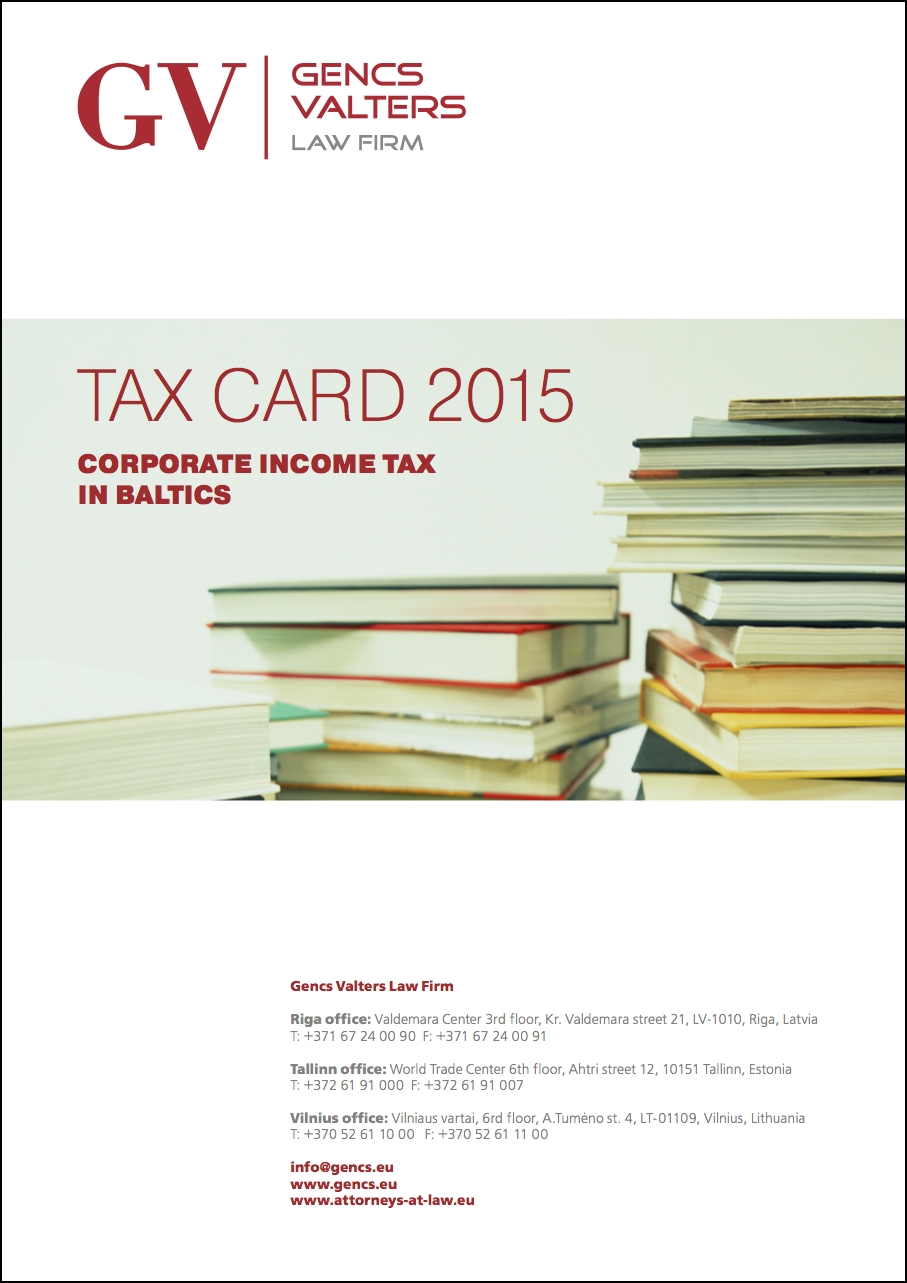
Baltic Tax Card 2015: Corporate income tax in Lithuania
 Taxpayers
Taxpayers
Corporate income tax is paid by:
- domestic companies – residents;
- non-residents;
- non-resident permanent establishments that perform economic activity.
 Taxable objects
Taxable objects
Corporate income tax is applied to the profit or loss, which is calculated according to the taxpayer’s financial accounting data and adjusted according to the Corporate Income Tax Law.
In general, all types of income are included in the taxable income consisting of:
- income earned in Lithuania or abroad (for residents);
- certain types of income earned in Lithuania and listed in the Corporate Income Tax Law (for non-residents);
- income earned from performing commercial activities in Lithuania (for non-resident permanent establishments).
 Tax rate in Lithuania
Tax rate in Lithuania
The flat corporate income tax rate is 15% of the taxable income.
For reduced tax rates please contact our lawyers and tax advisors.
 Taxation of dividends
Taxation of dividends
Payments of dividends between domestics companies are not subject to corporate income tax. Dividends paid to a legal entity – a resident of a European Union member state or a resident of the European Economic Area – are exempt from taxation.
Dividends paid to a legal entity outside the European Union or the European Economic Area, are subject to a 15% tax payable at the time of their payment (unless double taxation treaty provides smaller withholding tax rate).
 Taxation of income
Taxation of income
Corporate income tax in Lithuania is applied to the following payments in accordance with tax rates stipulated in the Corporate Income Tax Law:
- interest – 0 % or 15 % if loans or bonds repayment starts after 1 year, EEA bank deposit opened after 2014 January 1st, EEA state’s government securities acquired after 2014 January 1st .
- royalties – 10% (no deduction, Double taxation treaty rates may apply );
- capital gains from sale and lease of real estate located in Lithuania– 15%;
- payments to persons located in low-tax or tax-free countries or territories – 15%.
 Filing tax declarations
Filing tax declarations
Declarations for a particular taxation year shall be filled by taxpayers through the Electronic Declaration System or on paper forms and submitted to the State Taxes Inspection. Annual tax declarations shall be submitted by 1st June of the following year.
 Tax payment deadline
Tax payment deadline
Corporate income tax certificate shall be submitted and tax paid until 1st of June of subsequent tax year (previously until 1st of October).
In some cases taxpayers must pay advanced corporate income tax on a quarterly basis: by the last day of each quarter of the tax period. Advance payments are not mandatory if profit of a taxpayer does not exceed 290.000 EUR for the previous year.
 Tax incentives and relief
Tax incentives and relief
When calculating the amount of corporate income tax, taxpayers shall receive the following incentives and tax relief:
- Incentives to holding companies;
- Incentives for research and development;
- Tax relief for investment projects have been extended until 2018 and allow to deduct CIT up to 50% in case of investment in renewal or acquisition of facilities. Property as trucks, semitrailers etc., were added to the list of deductible investment expenses.
- Tax relief for Free Economic Zone (FEZ) companies;
- The possibility of carrying forward losses, save for 5 year limit set to losses from securities and derivatives.
For full TAX CARD 2015: Corporate income tax in Baltics click below
For more questions about corporate income tax in Latvia, Lithuania and Estonia, please contact our English speaking lawyers and tax consultants at info@gencs.eu




